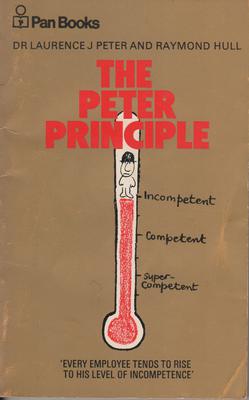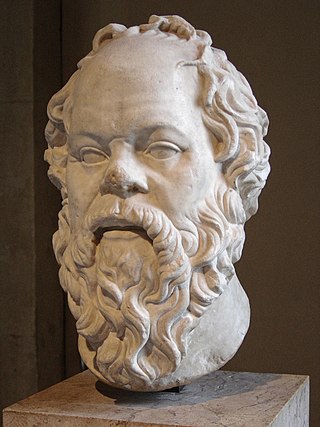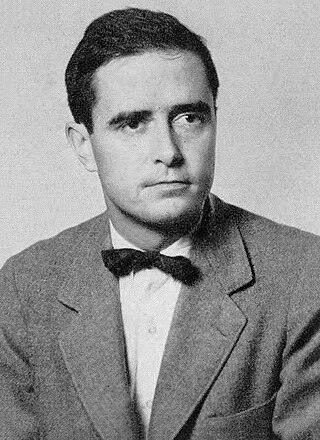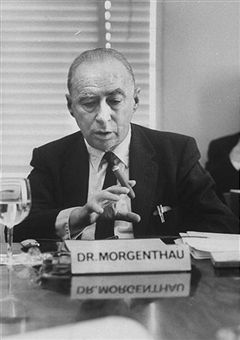
The Peter principle is a concept in management developed by Laurence J. Peter which observes that people in a hierarchy tend to rise to "a level of respective incompetence": employees are promoted based on their success in previous jobs until they reach a level at which they are no longer competent, as skills in one job do not necessarily translate to another.
Murphy's law is an adage or epigram that is typically stated as: "Anything that can go wrong will go wrong.".
The Clinton Doctrine is not an official government statement but an interpretation made by experts of the main priorities in the foreign policy of the Bill Clinton administration in the United States, 1993–2001.

An intellectual is a person who engages in critical thinking, research, and reflection about the nature of reality, especially the nature of society and proposed solutions for its normative problems. Coming from the world of culture, either as a creator or as a mediator, the intellectual participates in politics, either to defend a concrete proposition or to denounce an injustice, usually by either rejecting, producing or extending an ideology, and by defending a system of values.

Kingman Brewster Jr. was an American educator, academic and diplomat. He served as the 17th president of Yale University and as United States ambassador to the United Kingdom.
The Annapolis Convention, formally titled as a Meeting of Commissioners to Remedy Defects of the Federal Government, was a national political convention held September 11–14, 1786 in the old Senate Chamber of the Maryland State House in Annapolis, Maryland, in which twelve delegates from five U.S. states gathered to discuss and develop a consensus on reversing the protectionist trade barriers that each state had erected. At the time, under the Articles of Confederation, each state was largely independent from the others, and the national government had no authority to regulate trade between and among the states. New Hampshire, Massachusetts, Rhode Island, and North Carolina had appointed commissioners, who failed to arrive in Annapolis in time to attend the meeting, and Connecticut, Maryland, South Carolina, and Georgia had taken no action at all. The convention also related to George Washington's plans concerning the waterways connecting the Potomac and the Ohio River.

Fashionable Nonsense: Postmodern Intellectuals' Abuse of Science, first published in French in 1997 as Impostures intellectuelles, is a book by physicists Alan Sokal and Jean Bricmont. As part of the so-called science wars, Sokal and Bricmont criticize postmodernism in academia for the misuse of scientific and mathematical concepts in postmodern writing.

Hans Joachim Morgenthau was a German-American jurist and political scientist who was one of the major 20th-century figures in the study of international relations. Morgenthau was born in Coburg, Germany in 1904. Morgenthau's works belong to the tradition of realism in international relations theory; he is usually considered among the most influential realists of the post-World War II period. Morgenthau made landmark contributions to international relations theory and the study of international law. His Politics Among Nations, first published in 1948, went through five editions during his lifetime and was widely adopted as a textbook in U.S. universities. While Morgenthau emphasized the centrality of power and "the national interest," the subtitle of Politics Among Nations—"the struggle for power and peace"—indicates his concern not only with the struggle for power but also with the ways in which it is limited by ethical and legal norms.

John Milan Ashbrook was an American politician and newspaper publisher. A member of the Republican Party, he served in the United States House of Representatives from Ohio from 1961 until his death. Ashbrook was associated with the New Right. He ran against President Richard Nixon in the 1972 Republican Party presidential primaries, attempting to appeal to voters who believed Nixon was insufficiently conservative, but he failed to win any statewide contests. At the time of his death, he was running for U.S. Senate in Ohio in the 1982 election.

Mancur Lloyd Olson Jr. was an American economist and political scientist who taught at the University of Maryland, College Park. His most influential contributions were to new institutional economics, and focused on the role played by private property, taxation, public goods, collective action, and contract rights in economic development.
The law of triviality is C. Northcote Parkinson's 1957 argument that people within an organization commonly give disproportionate weight to trivial issues. Parkinson provides the example of a fictional committee whose job was to approve the plans for a nuclear power plant spending the majority of its time on discussions about relatively minor but easy-to-grasp issues, such as what materials to use for the staff bicycle shed, while neglecting the proposed design of the plant itself, which is far more important and a far more difficult and complex task.
Quoting out of context is an informal fallacy in which a passage is removed from its surrounding matter in such a way as to distort its intended meaning. Context may be omitted intentionally or accidentally, thinking it to be non-essential. As a fallacy, quoting out of context differs from false attribution, in that the out of context quote is still attributed to the correct source.
Thomas E. Ashbrook is an American journalist and radio broadcaster. He was formerly the host of the nationally syndicated, public radio call-in program On Point, from which he was dismissed after an investigation concluded he had created a hostile work environment. Prior to working with On Point, he was a foreign correspondent in Asia, and foreign editor of The Boston Globe. He currently hosts a podcast, Tom Ashbrook—Conversations .
Campbell's law is an adage developed by Donald T. Campbell, a psychologist and social scientist who often wrote about research methodology, which states:
The more any quantitative social indicator is used for social decision-making, the more subject it will be to corruption pressures and the more apt it will be to distort and corrupt the social processes it is intended to monitor.
In psychoanalysis, the narcissism of small differences is the idea that the more a relationship or community shares commonalities, the more likely the people in it are to engage in interpersonal feuds and mutual ridicule because of hypersensitivity to minor differences perceived in each other. The term was coined by Sigmund Freud in 1917, based on the earlier work of English anthropologist Ernest Crawley. Crawley theorized that each individual is separated from others by a taboo of personal isolation, which is effectively a narcissism of minor differences.

Norman Gary Finkelstein is an American political scientist and activist. His primary fields of research are the politics of the Holocaust and the Israeli–Palestinian conflict.
Steven F. Hayward is an American conservative author, political commentator, and policy scholar. He is a senior resident scholar at the Institute of Governmental Studies at the University of California, Berkeley, and a visiting lecturer at the UC Berkeley School of Law.
Hard cases make bad law is an adage or legal maxim meaning that an extreme case is a poor basis for a general law that would cover a wider range of less extreme cases. In other words, a general law is better drafted for the average circumstance as this will be more common.
Peter W. Schramm was an American academic and political scientist. He was a professor of political science at Ashland University and the former executive director of the Ashbrook Center for Public Affairs in Ashland, Ohio.
David Sayre was an American scientist, credited with the early development of direct methods for protein crystallography and of diffraction microscopy. While working at IBM he was part of the initial team of ten programmers who created FORTRAN, and later suggested the use of electron beam lithography for the fabrication of X-ray Fresnel zone plates.







